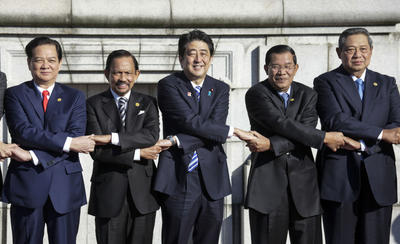This was widely seen by observers as an oblique criticism of Beijing. It was also during the summit that Japan announced a massive 2 trillion yen (US$20 billion) pledge in aid and loans to Southeast Asian countries.
But given that ASEAN does not have the military, political and economic heft to substantially influence or balance against China, why has Japan’s pursuit of ASEAN intensified in recent times?
Firstly, Japan is trying to legitimise its plans for an increased security presence in the region and is using ASEAN as a conduit to that end. During the summit, Japan tried to seek confirmation and acceptance from ASEAN for its expanding security role. If ASEAN accepts — or even tolerates — Japan’s expanded security position, it would give Tokyo a platform on which to question China’s continued resistance and to construct a perception that such resistance is not attuned to today’s political landscape. Furthermore, having ASEAN support for its national security agenda would make Abe’s security plans a better sell to his domestic audience.
Secondly, in a geopolitical region where allies are scarce, strained relations aplenty and US commitment uncertain, ASEAN is the next natural place to look for support. Japan has done this through attempts to link China’s assertive behaviour in the East China Sea as signs of a broader, hard-line Chinese revisionist project. By framing the territorial disputes in the East China Sea and South China Sea as issues that implicate the entire region — rather than isolated incidents — Japan is trying to paint China as a common, shared threat to regional stability. And by presenting itself as an economic surrogate to Beijing — through aid, loans, investments and technology transfers — Japan is angling for ASEAN to take a stronger stance toward China without being paralysed by fears of economic reprisals.
Finally, China’s own engagement with ASEAN makes it a geostrategic imperative for Japan to court ASEAN. The dispute in the East China Sea is no longer simply about the territoriality of a few uninhabited islands — it has become a broader geopolitical competition between a waning power trying to regain regional (and global) relevance and an emergent power still uncertain how to manage its newfound clout. ASEAN sits right at the heart of this competition. Its self-proclaimed neutrality makes it an attractive, albeit perceived, tabula rasa to mould and influence.
Unfortunately for Japan the benefits it can accrue from courting ASEAN come with built-in limits it must be aware of.
ASEAN is still cautious about Japan’s security intentions. Indonesia, an influential ASEAN actor, issued a guarded note during the summit, saying that Japan’s evolving security role should be ‘pursued gradually, in a transparent manner’ and stressed the importance of good China–Japan relations to the region. Also, despite Abe’s claims that ASEAN and Japan are united in their concerns over China’s Air Defence Identification Zone (ADIZ), the joint statement issued made no direct reference to China or the ADIZ. In fact, after the establishment of the ADIZ, ASEAN’s response, excluding the Philippines, has been relatively muted. Further, despite Abe’s push to strengthen security ties with ASEAN during the joint summit, Sultan of Brunei Hassanal Bolkiah — the co-chair of the summit — focused on economic issues.
ASEAN is under no illusion that the region’s economic prosperity for the immediate and foreseeable future is tied to China. — China has been ASEAN’s largest trading partner since 2009. As such, it is an arduous task for Japan to challenge China’s economic value to ASEAN.
ASEAN’s core principles — non-interference, decision-making by consultation and consensus and its non-security nature — also make it difficult for it to take a united position over the South China Sea disputes. Thus, it would be difficult for Japan to get ASEAN on its side in the territorial dispute against China.
Despite these limits, Japan’s pursuit of ASEAN is not entirely futile and it doesn’t look like it is going to stop anytime soon. While ASEAN welcomes Japan and its offer of economic, technical and technological assistance, Japan must realise that its increased security ambitions and its persistent pressing for support will cause unease in the region. To make lasting and influential inroads into ASEAN, Japan needs to cast aside its security agenda (for now) and separate the benefits offered in exchange for implicit support vis-à-vis China. It would be unwise for Japan to alienate ASEAN in its overzealous attempts to gather geopolitical support — especially when it does not have many close friends around.
Dylan Loh Ming Hui is a research analyst with the S. Rajaratnam School of International Studies (RSIS), Nanyang Technological University.

